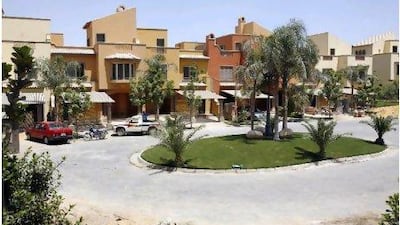Regional investors will be looking at Egypt this week as quarterly earnings from two key developers are expected to give an indication of the country's property outlook after the political turmoil that began in January.
Palm Hills Developments and Egyptian Resorts are slated to release their first-quarter results in the coming days.
Many developers are being investigated for land purchases completed under the administration of the former president Hosni Mubarak, with some transactions nullified because of corruption.
"There is a lot of uncertainty. The numbers will be bad, but contingent liabilities, what we don't know, is probably going to affect trading on property companies in the short term," said Saleem Khokhar, a fund manager at National Bank of Abu Dhabi. "Investors will be looking to see if there is a resolution … At the moment you can't put a figure on it and determine whether [Egyptian property companies] will still be solvent at the end of it."
Deutsche Bank expects weak results from Palm Hills, which is facing scrutiny on 350 hectares - 9 per cent of its land bank.
Earnings at Palm Hills "remain secondary" as investors "continue to focus on land litigation that has put the value of Palm Hills in jeopardy", Nabil Ahmed, an analyst at Deutsche Bank, said in a note to clients.
In addition to the political uncertainty and land disputes, Egyptian developers are facing risks related to the execution of projects, availability of financing, slower sales and weak consumer confidence.
The quarterly reports may temporarily slow the market after its strong performance last month, said Mohammed Ali Yasin, the chief investment officer at CAPM Investment in Abu Dhabi.
"Real estate stocks should be avoided in the short term," Mr Yasin said.
Shares have rallied 6.5 per cent in Egypt since May 22, as governments and other donors pledged billions of dollars in assistance to the country.
The budget for the fiscal year starting next month forecasts expenditure of 86.5 billion Egyptian pounds, up from 69bn pounds last year, while the country's deficit is expected to widen to 10.9 per cent of GDP from 8.6 per cent this year.
"Egypt was the best-performing market in the [Middle East and North Africa] region in May, and I expect that trend to continue as it is the market that has the most catch-up to do in the Mena region since the revolution," Mr Yasin said.
In the UAE, trading of bank stocks is expected to gain momentum as investors position themselves for the end of the second quarter.
"We saw encouraging signs last week that the market's moving into the positive range in anticipation that the second-quarter results will be as good as the first quarter and confirm the belief that the pressures from the crisis on the banking sector are receding gradually," Mr Yasin said.
The Abu Dhabi Securities Exchange General Index was 2.5 per cent higher at 2,672.55 points at the end of last week, while the Dubai Financial Market General Index was up 1.3 per cent at 1,566.34.
Sultan al Suwaidi, the Governor of the Central Bank, said last week lenders should lower interest rates on loans to help businesses.
"Investors believe even if lending margins shrink, banks will benefit from higher loan volumes," said Ameed Kanaan, the general manager at AlJazeera Financial Services in Dubai.
Bank deposits in the UAE rose to Dh1.1 trillion in March, their highest level in more than two years, but banks were reluctant to lend.
The markets are also awaiting this week's Opec meeting. Ali al Naimi, Saudi Arabia's oil minister, took a cautious tack on Thursday, repeating previous comments that Opec would increase production if there was more demand for crude.
The International Energy Agency (IEA), an adviser to 28 industrialised countries, reiterated on Friday its call for Opec to boost output to reduce oil prices further.
"There is a need for more oil in the market, and we hope producing countries are reading the market signals in the way we are," Fatih Birol, the chief economist for the IEA, told Reuters.
Brent crude rose 0.2 per cent to $115.84 a barrel on Friday.
Elsewhere in the region at the end of last week, Oman's measure was 2.1 per cent higher at 6,081.76 points, Bahrain's declined 0.8 per cent to 1,339.21, Kuwait's slipped 0.2 per cent to 6,338.70 and Qatar's fell 1.5 per cent to 8,240.39. The Saudi Tadawul All-Share Index closed down 1.73 per cent to 6,624.95 yesterday.

